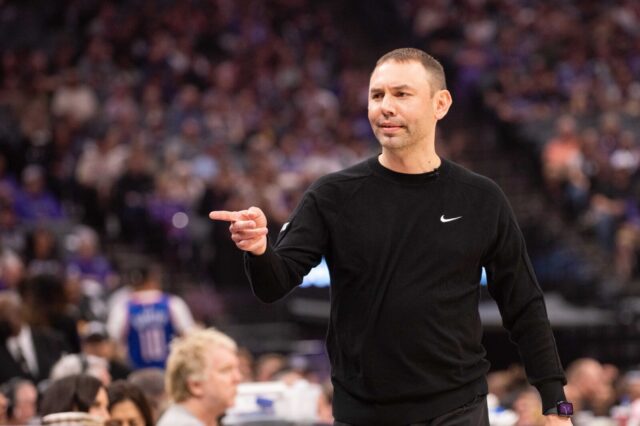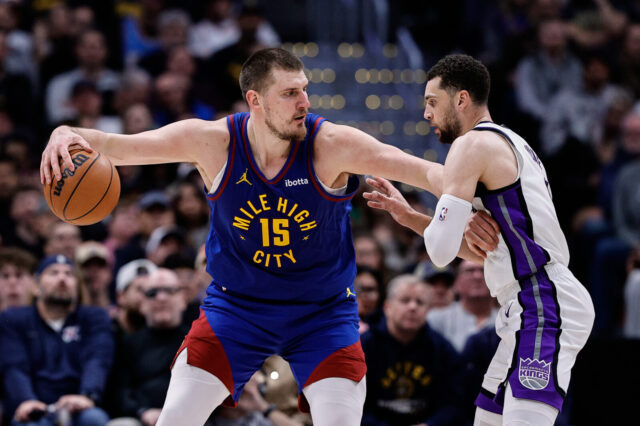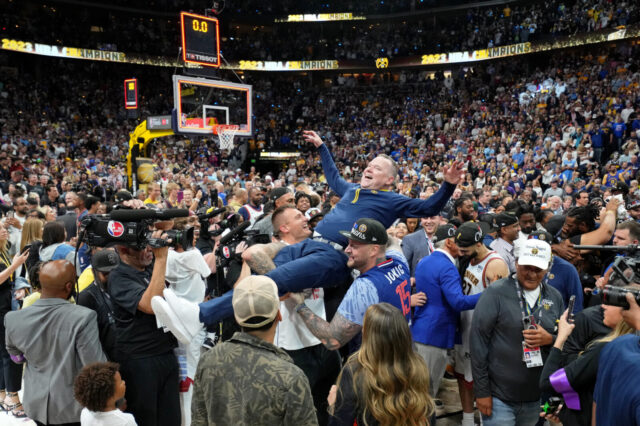As an English major at CSU, I spent a lot of time refining the skill of writing a good literary essay. I came to enjoy the art of coming up with a solid thesis and then using supporting documentation to prove the validity of that thesis. With this in mind, I thought I would take a crack at dusting off this skill and applying it to the Denver Nuggets’ upcoming season and why I believe this team has a chance to reach their full potential – something we may not be able to say about any other Nuggets team in the recent past.
Thesis:
The Nuggets’ inability to reach their full potential during years in which there was evidenced strife and conflict within the locker room suggests that the current Nuggets’ chemistry both on and off the court should allow them to finally reach new levels of success that we’ve yet to witness from this team.
Supporting facts:
The conflict and tension between George Karl and some of his most talented players on the team during his time coaching the Nuggets from 2005 to 2013 is a perfect example of how a team’s success can be hindered by strained relationships. While this era allowed us to finally see the Nuggets advance all the way into the conference finals, many fans think that the team had the potential to win a championship in 2009. We need not look for more proof that there was strife in the locker room than in the drama that unfolded after George Karl released his autobiography titled “Furious George” in 2017. Players that were mentioned in this book in a not so positive light, such as J.R. Smith and Kenyon Martin, rightfully did not take too kindly to these comments.
This conflict is further proven in comments that Martin made during the team’s “2000s night” last season, in which he basically stated that one of the reasons why they dropped some important games against the Los Angeles Lakers in the 2009 Western Conference Finals is because the coaching staff had them run the same plays over again during crucial moments in the game, and that this decision led to at least one of the now infamous turnovers from out-of-bounds.
While this is a completely legitimate argument, and most likely was a mistake on the coach’s part, it should also be looked at as one example of a much larger problem. The players did not completely respect Karl (at least his decisions on the court). Karl was notorious for not wanting to run plays for his team, opting instead to let them freestyle on the offensive end. And during those moments when he did have to call plays, obviously some of the players did not agree with the plays that he called. I recall Martin saying something to this effect during 2000s night, basically admitting that no team can expect to not have to change their style of play when going from the regular season to the playoffs, and that this was a large reason why the Nuggets were not able to advance to the Finals. This can be seen as an “X’s and O’s” debate involving professionals rather than a chemistry issue, but it’s hard to argue that there was a lot of tension during that era that could have influenced the player’s take on these decisions and their opinion on the head coach, and ultimately could have contributed to their defeat in the conference finals.
Even ignoring the criticism that Martin has made on the coaching style of Karl, looking at the personal attacks that Karl made against players such as Martin, Smith, and Carmelo Anthony clearly signals that there was a lot of tension in the locker room. A lack of the mutual respect that is ideal within the player/coach dynamic. While Chauncey Billups’ presence may have helped to solve a lot of these issues, as he probably served as a mediator between the coaches and the players, there was obviously still chemistry issues during that 2008-09 season and this all came to the surface in Karl’s autobiography and in subsequent interviews with players.
So here we have a team that a) had a head coach that years after splitting with the team wrote a memoir in which he criticized the star players and their upbringing and b) players that fault the coaching style of their coach for many of the team’s failures. This all could have been a reason why this team was not able to reach that next milestone, despite the fact that they seemed to have all the right pieces on paper. Furthermore, the 2012-2013 team clearly had a much better chemistry and lightness to them. They were able to achieve 57 wins, the most since joining the league, but were still ousted in the playoffs. However, you could still feel during this season that there was some tension, albeit minor, that existed between Karl and his team (probably mainly over playing time).
Then, the Brian Shaw era happened. I don’t think fans have to be reminded of the time that Shaw admitted to using a book on millennials in order to relate to his younger players. Is there anything more obvious that a coach is struggling to connect with his team? This disconnect trickled down into the locker room and then on the court, where it was clear that players were just not nearly as invested in winning as they should be.
In contrast, this current team has a much better chemistry and fondness for one another and this should do nothing but help lead them to achieve success that Nuggets fans have not yet seen their team achieve. It seems that all of the players genuinely want to be here, and plenty of quotes from Media Day prove this. Look no further than the Denver Stiffs Media Day stream for articles that highlight these quotes, such as this one in which Nikola Jokic commends Gary Harris for visiting Sombor over the summer for Basketball Without Borders; this one in which Isaiah Thomas credits Michael Malone and the realization that this team loves being around one another as a huge factor in why he decided to join the team; and this one by Brendan Vogt in which there’s a great quote from Coach Malone about how this team doesn’t just play with one another, they play for one another.
And what should be the ultimate goal after achieving this level of chemistry? According to Jokic, the Nuggets should look towards the 2011 Dallas Mavericks that won the NBA Championship as an example. He notes that they did not have a “superteam” but they still won the title. When you have a team that really loves playing with one another and there isn’t a lot of tension between the coach and his players, combined with the young talent that the Nuggets have, a championship should be the end goal.
CONCLUSION:
All in all, the documentation seems to support the idea that we have never (at least in the more recent years) seen a Nuggets team that enjoys being around one another as much as the team that we have now. Malone obviously has been the recipient of criticism from fans, but we haven’t really heard this criticism from the players themselves, besides maybe one or two remarks after a bad loss that may suggest a player was unhappy with a play or lack of minutes. Beyond that, Thomas’ praise of Malone seems to be much more of the typical comment that we hear from the players when asked about Malone. And we definitely haven’t seen anything like the strained relationship between coach and players that we saw with George Karl or Brian Shaw.
While a team needs more than just chemistry to succeed, you could argue that the lack of chemistry and these strained relationships may very well have been a barrier between the Nuggets and their potential in the past. The Nuggets’ lack of success during these years can at least partially be attributed to never finding the exact right formula of a coach that all of the players respect and trust, and players that all have one goal in mind, with no ego or personal goals to get in the way.
Am I reading way too much into all of this and expecting too much out of this team simply because of the “supporting documentation” that in all honestly, can be interpreted in a completely different way by a different analyst with a different thesis to prove? This is highly possible. But I am an English major after all, so what do you expect?
(I was going to now attempt to cite my sources in MLA format, as I did so many times while in school, but who am I kidding? That’s one thing I will never miss doing).


